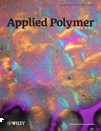
JOURNAL OF APPLIED POLYMER SCIENCE
metrics 2024
Pioneering Discoveries in Polymer Science
Introduction
The Journal of Applied Polymer Science, published by Wiley, is a leading journal in the field of polymer science, showcasing innovative research and applications in various domains since its inception in 1959. With an ISSN of 0021-8995 and an E-ISSN of 1097-4628, it is indexed in prominent databases, maintaining a strong presence with Scopus rankings placing it in the Q2 category across multiple disciplines, including Chemistry, Materials Chemistry, and Polymers and Plastics. The journal’s commitment to advancing scientific knowledge is reflected in its impact on the materials science community, with noteworthy rankings such as #38 in Surfaces, Coatings and Films and #51 in Polymers and Plastics. Though not an open-access publication, it remains a vital resource for researchers, professionals, and students aiming to deepen their understanding of polymer applications and to stay abreast of the latest developments in this ever-evolving field. With a focus on high-quality research, the Journal of Applied Polymer Science continues to be a cornerstone for those engaged in polymer research and its myriad applications.
Metrics 2024
 0.56
0.56 2.70
2.70 2.80
2.80 193
193Metrics History
Rank 2024
Scopus
IF (Web Of Science)
JCI (Web Of Science)
Quartile History
Similar Journals

Polymer-Plastics Technology and Materials
Empowering Global Collaboration in Polymer StudiesPolymer-Plastics Technology and Materials is a premier academic journal published by Taylor & Francis Inc., dedicated to the dynamic fields of chemical engineering, materials chemistry, and polymers and plastics. With an impact factor that reinforces its reputation, this journal is strategically indexed in Scopus, ranked notably within its categories (Q2), showcasing its influence and relevance in the academic community. Since its inception in 2019, the journal has served as an essential platform for researchers, professionals, and students to disseminate innovative studies and advancements in polymer science and materials technology. As an Open Access publication, it ensures that cutting-edge research is accessible to a global audience, fostering collaboration and knowledge sharing in the material sciences. Located in the United Kingdom, Polymer-Plastics Technology and Materials continues to enhance the dialogue within the industry, addressing critical challenges and exploring emerging trends that shape the future of polymer and plastics technologies.

Polymers
Connecting research and application in polymer technology.Polymers is a premier journal published by MDPI, dedicated to advancing the field of polymer science and technology. This open-access journal, established in 2009, has quickly gained prominence in the academic community, serving as a vital platform for disseminating high-quality research articles, reviews, and communications in the realms of chemistry, polymers, and plastics. Based in Switzerland, with an impressive ranking in the Q1 quartile for both Chemistry and Polymer studies, Polymers boasts a significant impact factor, reflecting its rigorous peer-review process and esteemed editorial board. Researchers, professionals, and students alike benefit from the broad accessibility of content, allowing for a more extensive reach and engagement within the scientific community. As a key resource for the latest advancements and innovations in polymer research, Polymers continues to lead discussions, inspire collaborations, and foster the development of novel materials that shape various industrial applications.

INTERNATIONAL POLYMER PROCESSING
Fostering Collaboration in Chemical and Materials SciencesINTERNATIONAL POLYMER PROCESSING, published by WALTER DE GRUYTER GMBH, serves as a crucial platform for professionals and researchers in the fields of Chemical Engineering, Industrial and Manufacturing Engineering, and Materials Science, particularly focusing on polymers and plastics. With its ISSN 0930-777X and E-ISSN 2195-8602, this journal has been in circulation since 1988 and continues to expand its contributions to contemporary research trends through to 2024. Ranking in the third quartile across multiple categories, including Chemical Engineering (miscellaneous) and Materials Chemistry, it offers insightful and rigorous peer-reviewed articles that enhance the understanding of polymer processing technologies and innovations. This journal is vital for anyone engaged in polymer science and engineering, providing both theoretical and practical perspectives that advance the field. Although it does not provide open access, the journal's content is indispensable for academia and industry professionals looking to stay at the forefront of polymer research.

JOURNAL OF POLYMER SCIENCE
Pioneering Discoveries in Polymer Science for Tomorrow's SolutionsJOURNAL OF POLYMER SCIENCE, published by WILEY, is a premier, open-access journal dedicated to advancing the field of polymer science and its applications. With an ISSN of 2642-4150, it offers a platform for high-quality research and innovative ideas, contributing significantly to the understanding of polymaterials and their functionalities. The journal is recognized for its exceptional impact within various categories, consistently achieving Q1 rankings in Materials Chemistry, Physical and Theoretical Chemistry, and Polymers and Plastics, demonstrating its influential presence in the academic community. As of 2023, it holds a distinguished position in Scopus rankings, underscoring its relevance and rigorous peer-review process. By facilitating open access to vital research findings, the JOURNAL OF POLYMER SCIENCE plays a crucial role in fostering collaboration and knowledge transfer among researchers, professionals, and students, paving the way for innovative developments in polymer applications and materials science.
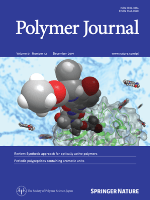
POLYMER JOURNAL
Connecting Theory and Application in Polymer ResearchPOLYMER JOURNAL, published by SpringerNature in the United Kingdom, is a premier academic platform dedicated to the field of polymer science. Since its inception in 1971, this journal has become an essential resource for researchers and professionals interested in the latest advancements in materials chemistry, polymers, and plastics. With its robust H-index and a consistent ranking in the top quartiles of its categories—Q2 in both Materials Chemistry and Polymers and Plastics—POLYMER JOURNAL demonstrates a strong impact in the scientific community. It holds significant recognition in Scopus rankings, occupying the 68th percentile in Materials Chemistry and the 67th percentile in Polymers and Plastics. The journal's commitment to publishing high-quality research articles enables it to serve as a key reference point for innovative studies, theoretical developments, and practical applications in polymer science. Although it is not an open-access journal, researchers and students gain valuable insights through its extensive archives and rigorous peer-reviewed content, making POLYMER JOURNAL a vital source of knowledge for anyone engaged in this dynamic field.
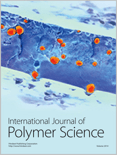
International Journal of Polymer Science
Exploring New Frontiers in Polymer ApplicationsInternational Journal of Polymer Science is a prominent and peer-reviewed journal dedicated to advancing the field of polymer science. Published by Hindawi Ltd, this open-access journal has been making significant contributions to the discipline since its inception in 2009, ensuring that research findings are accessible to a global audience. With an impressive impact factor and positioned in the Q2 quartile for Polymers and Plastics as of 2023, it ranks 46th out of 161 in the Scopus database, reflecting its strong standing in the research community. The journal welcomes innovative research across various topics within polymer science, including synthesis, characterization, and applications in diverse industries. By providing a platform for scholars, professionals, and students, the International Journal of Polymer Science not only encourages the dissemination of knowledge but also fosters collaboration and innovation in this essential field. Based in Egypt and operating under a rigorous selection process, it remains a vital resource for anyone involved in polymer research.

FIBERS AND POLYMERS
Connecting Theory and Practice in Materials ScienceFIBERS AND POLYMERS is a prestigious scholarly journal published by the Korean Fiber Society, specializing in the fields of Chemical Engineering, Chemistry, and Polymer Science. Since its inception in 2000, the journal has provided a dynamic platform for researchers and professionals to disseminate cutting-edge findings and innovative methodologies related to fibers, polymers, and their diverse applications. With its Q2 category ranking across multiple disciplines in 2023 and a commendable standing in Scopus rankings—ranking #183 in General Chemistry and #127 in General Chemical Engineering—it is well-regarded within the academic community. The journal’s commitment to quality research is further underscored by its comprehensive coverage of technological advancements and theoretical developments relevant to both industry and academia. Access to published articles may vary, and authors are encouraged to submit original research to contribute to this evolving field. Join the community shaping the future of materials science through FIBERS AND POLYMERS.
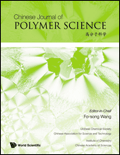
CHINESE JOURNAL OF POLYMER SCIENCE
Innovative Research at the Forefront of Polymer ScienceThe CHINESE JOURNAL OF POLYMER SCIENCE, published by SPRINGER, stands as a premier periodical in the realm of polymer science, showcasing cutting-edge research and technological advancements since its inception in 1985. With an impressive impact factor reflecting its significance in the field, this journal is categorized in the top quartiles (Q1) of Chemical Engineering, Organic Chemistry, and Polymers and Plastics. It features a wide spectrum of innovative studies, thus serving as an essential resource for researchers, professionals, and students dedicated to understanding and advancing polymer-related technologies. The journal is indexed in Scopus, with notable rankings that highlight its influence in the disciplines of organic chemistry and materials science, making it a vital communication platform for authors around the globe aiming to disseminate impactful findings. Although not an open-access publication, the journal ensures robust accessibility through institutional subscriptions and partnerships, further emphasizing its commitment to the advancement of polymer science.
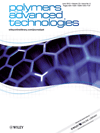
POLYMERS FOR ADVANCED TECHNOLOGIES
Connecting Researchers to the Future of PolymersPOLYMERS FOR ADVANCED TECHNOLOGIES is a premier peer-reviewed journal published by WILEY, focusing on cutting-edge research in the field of polymers and plastics. Since its inception in 1990, the journal has established itself as a critical resource for academics and industry professionals alike, reflecting advancements and innovations in polymer science and technology. With an impressive Scopus ranking of #45 out of 161 in the Materials Science category and a 72nd percentile ranking, it ranks in the Q2 quartile for its relevance and impact within the polymers field. The journal's comprehensive scope encompasses recent developments and trends in polymer applications, synthesis, and characterization, making it essential reading for researchers looking to advance their work within this dynamic area. Researchers can submit their work in the UK, where the journal is published, and while it does not currently offer open-access options, its robust impact factor highlights the significance of the research it disseminates. Join the community of experts pushing the boundaries of polymer science by engaging with POLYMERS FOR ADVANCED TECHNOLOGIES. Continuous exploration and innovation await those who contribute to and learn from the journal’s diverse array of studies.
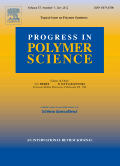
PROGRESS IN POLYMER SCIENCE
Empowering Researchers with High-Impact FindingsPROGRESS IN POLYMER SCIENCE is a prestigious academic journal published by PERGAMON-ELSEVIER SCIENCE LTD, dedicated to advancing the field of polymer science. With an ISSN of 0079-6700 and an E-ISSN of 1873-1619, this journal has established itself as a leading source of high-quality research since its inception in 1967. It ranks in the top quartile (Q1) across multiple categories including Ceramics and Composites, Materials Chemistry, Organic Chemistry, Polymers and Plastics, and Surfaces and Interfaces, reflecting its strong reputation and impact within the scientific community. The journal features rigorous peer-reviewed articles that not only contribute to theoretical advancements but also emphasize practical applications of polymer science in various industries. Although it is not an open-access journal, it remains accessible through institutional subscriptions and provides invaluable insights and data for researchers, professionals, and students alike. PROGRESS IN POLYMER SCIENCE is essential reading for anyone looking to stay abreast of the latest developments and innovations in this dynamic field.